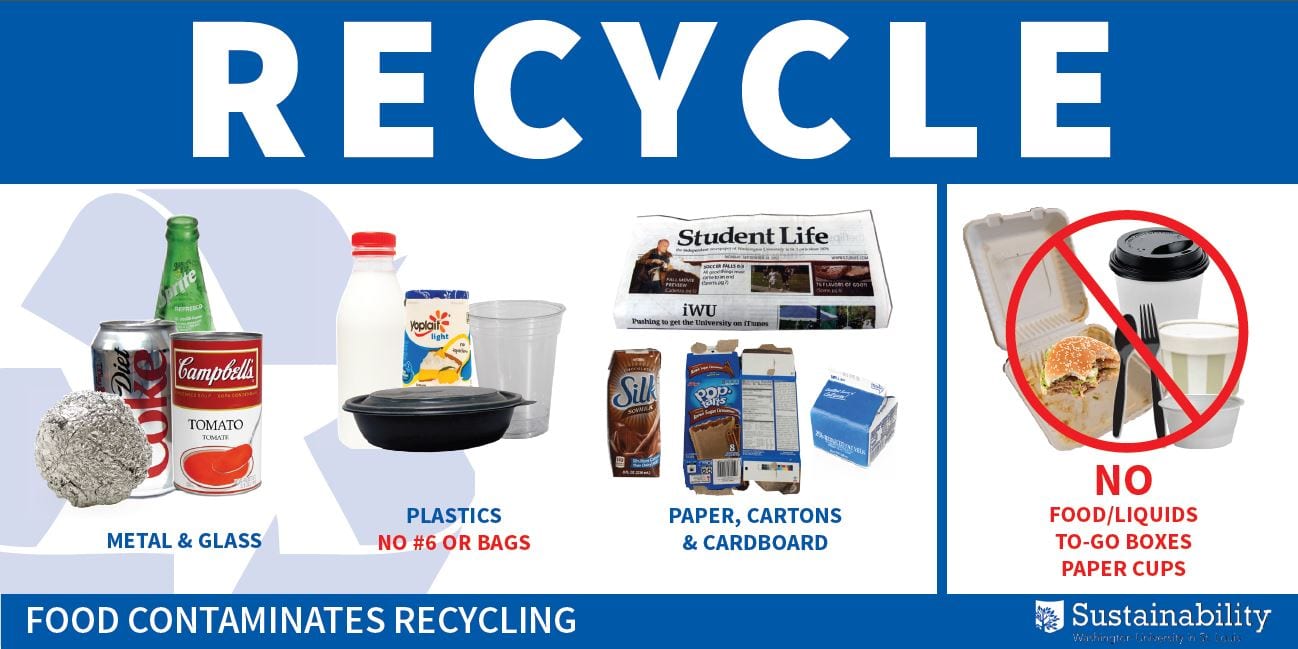Single-stream recycling (in contrast to sorting recyclable materials into multiple bins) provides an easy and convenient method for capturing valuable materials and returning them to the economy. Washington University in St. Louis, as well as most surrounding communities, gives waste producers two primary options for sorting their waste: recycle or landfill. Many everyday materials can be recycled in designated bins throughout WashU campuses. In addition, most major dining locations also include post-consumer compost collection for organic waste and compostable service ware.
WashU campuses transitioned to the single-stream recycling process in 2010. The simplicity of the single-stream recycling system has helped the university nearly double consumer waste diversion. Institution-wide, approximately 45% of consumer waste is diverted from landfills through recycling and composting. Waste audits indicate that as much as 70% of office consumer waste can be recycled and as much as 80% of dining service waste can be recycled or composted. The Bear’s Den eatery has achieved approximately 80% waste diversion through enhanced signage, peer-to-peer education, intentional purchasing and staff training.

What Can You Recycle in Single Stream?
Single-stream recycling makes the process easy, but it is important to follow basic guidelines. In the WashU single-stream program, you can recycle anything that falls into these categories:
- Paper: most office papers, including white, colored and coated paper; magazines and catalogs; envelopes (even with plastic windows); phone books, etc. Paper bags and the sleeves from coffee cups. EXCEPTIONS include: food-soiled to-go boxes, paper coffee cups and paper to-go cups/bowls.
- Cardboard: all corrugated and non-corrugated cardboard boxes. Break down boxes; if it won’t fit in a bin, our custodial staff knows to take it to recycling containers located on university docks.
- Plastics: Recycle plastic containers #1-5 and 7. Shake or wipe out any plastic to-go ware with food or liquid contents. EXCEPTIONS include: plastic bags, Styrofoam and #6 plastics. Leave bottle caps on bottles. Reduce the need to send items to the landfill by avoiding purchasing #6 plastic items.
- Aluminum and Steel: Food and beverage containers. Before disposal, empty out the contents.
- Glass containers: EXCEPTIONS include: Pyrex, broken glass and heat resistant lab glass. Empty contents of jars and bottles before recycling.
Follow signage posted in dining and residential areas to avoid contamination. Want more specifics on what goes where? Check out Waste Sorting FAQ.
Many other products can be donated or recycled through specific vendors. WashU also has options for responsibly disposing of miscellaneous and hazardous waste.
Don’t be a “Wish-cycler”
What is “wish-cycling”? It’s the phenomenon of putting items in single-stream recycling or other special collection streams that do not meet the stated criteria or guidelines… but you really hate throwing things away. If it can’t be recycled (or if it can’t be recycled in your local market), don’t put it in the recycling bin. Items like this contaminate the good materials and make it more expensive (and less viable) to recycle the good stuff. Instead, avoid buying the material in the first place by seeking alternatives, like reducing packaging or reducing consumption.
Campus Race to Zero Waste
Campus Race to Zero Waste, previously called Recyclemania, is a nationwide eight-week-long recycling competition in which over 350 schools compete in a variety of categories rewarding increased waste diversion rates. The university’s performance has improved drastically since the competition began in 2003, especially with the shift to single-stream recycling. In 2015, WashU recycled 1,000,012 pounds of materials and composted 87,340 pounds of food organics, resulting in a diversion rate of 44.65%. WashU also collected 25,781 pounds of e-waste over a 4-week period, placing 16th in the nation for this category.
Volunteer Opportunities
Are you a recycling enthusiast? Recycling Geniuses engage in peer-to-peer education, helping others navigate WashU’s waste sorting system. Sign up today! Students, staff, and faculty are all welcome to apply!